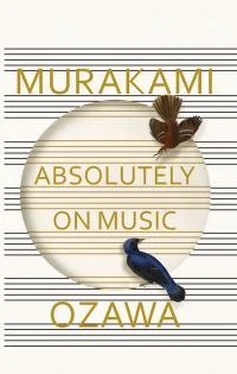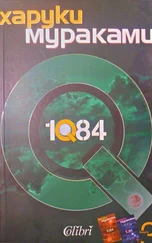OZAWA: Hmm, no, I don’t think I was. Maybe a few times by individual audience members, but never again by the whole house like that.
MURAKAMI: Do you think there was some resistance to the idea of an Asian conducting Italian opera at La Scala?
OZAWA: Well, look, don’t you think it was just that the music sounded a little different from what they were expecting? The sound I gave to Tosca was not the Tosca that they were used to. I think that’s what it was. And also, of course, to some extent, as Italians, they had a hard time accepting the fact that an Asian conductor could come and conduct Tosca. Sure.
MURAKAMI: Back then, weren’t you the only Asian conducting at a first-class European opera house?
OZAWA: Yes, I suppose I was. But as I said before, I had the enthusiastic support of the orchestra members at La Scala, and of the chorus, for which I was very grateful. It was the same thing at Chicago. The first year I was appointed music director at the Ravinia Festival, the newspapers tore me to bits. The music critic at the most influential paper just didn’t like me, I guess, or maybe there was something else going on behind the scenes, but he wrote these scathing reviews of my performances. It was the same as when Lenny was lambasted by the New York Times music critic Schonberg. But the orchestra members gave me their full support, and at the end of the first season, they even gave me a shower.
MURAKAMI: A shower?
OZAWA: I had never heard of such a thing, either, at the time. You know how the conductor withdraws from the stage at the end of the last number and then comes out again for a bow? At that point, the musicians all make random noises with their instruments—the trumpets, the strings, the trombones, the timpani all together make one big fwaaan or gaaaan sort of noise. You see what I mean?
MURAKAMI: I see.
OZAWA: That’s called a “shower.” It took me totally by surprise, I didn’t know what was going on. So the second violinist, who was the orchestra’s personnel manager, came over and explained it to me and said I should keep it in mind for the future. In other words, this was kind of like the orchestra’s musical protest to the critical reviews
MURAKAMI: Oh, I get it.
OZAWA: That was my first and last shower experience. The Chicago papers were trying to destroy me, to get rid of me. But I contracted with the Ravinia Festival for the following summer and, let’s see, how many years was I with them? Five years altogether, I think. They didn’t manage to destroy me.
MURAKAMI: I guess you have to bear up under such external pressure and survive.
OZAWA: Maybe you could say that. But to some extent I was already used to that kind of stuff. In Vienna, in Salzburg, in Berlin—the reviews were scathing at first. So I was pretty accustomed to getting dumped on.
MURAKAMI: Scathing reviews? What would they say?
OZAWA: I don’t know, I couldn’t read the papers! But people used to tell me they were really bad.
MURAKAMI: Maybe it was like a baptism of fire that all newcomers have to go through.
OZAWA: No, I’m sure it wasn’t that. There are lots of people who never experience it. Take Claudio Abbado, for example. I don’t think he ever got a bad review. He was recognized as a gifted conductor right from the start.
MURAKAMI: In those days, there weren’t any Asian musicians active in Europe. Do you think that made the headwinds against you all the stronger?
OZAWA: Well, it was very big news back then when the Japanese viola player Kunio Tsuchiya became a member of the Berlin Philharmonic in 1959—an epoch-making event. Nowadays, it would be hard to imagine a major European or American orchestra without Asian string players. Things have really changed.
MURAKAMI: I suppose they assumed back then that an Asian musician couldn’t understand Western music.
OZAWA: That might have been part of it. I really don’t remember what they were saying about me exactly. The orchestra performers themselves, though, welcomed me warmly. I think that to some extent, they felt sorry for me. Here’s this young guy who comes from faraway Asia all by himself and everybody’s giving him a hard time, so let’s get behind him. That kind of thing.
MURAKAMI: That kind of support from your fellow musicians must be very encouraging when the media are being so negative.
The Fun Far Outstripped the Hardships
MURAKAMI: When you’re conducting an opera, you have to relate not only to the orchestra but to the singers, too. You have to direct them both. Isn’t it hard to get used to doing that?
OZAWA: Well, it’s all a matter of contact. You have to make contact with the orchestra and with the singers at the same time.
MURAKAMI: Unlike members of an orchestra, singers are more or less in business for themselves—they’re the stars—so aren’t they harder to handle?
OZAWA: There are some difficult personalities, of course, but once you start working on a piece and asking them to “sing this part like this” or whatever, there’s really nobody who is going to object. Everybody wants to do the right thing.
MURAKAMI: So you haven’t had that much trouble with opera singers?
OZAWA: That Così fan tutte in Salzburg was the first staged opera I had ever worked on in my life, and I did absolutely nothing to hide that fact. Before we started, I announced to everybody, “This is my very first opera,” so they all pitched in and very kindly taught me everything—from the singers on down to the assistant conductor. Maestro Karajan, of course, guided me through several parts, and even Claudio Abbado showed up and taught me things—like how to make the sound of the orchestra work with the singers’ voices.
MURAKAMI: Nobody was mean to you?
OZAWA: Mean? I wonder. Maybe somebody did something mean, but I didn’t know it at the time! [ Laughter. ] We got along very well. It was like one big, happy family. I invited everybody over for a potsticker party.
MURAKAMI: So it was less a matter of everyone’s confronting the challenge of putting on an opera together than just enjoying the whole thing?
OZAWA: Yes, it was much more like that. Of course, I had a very strong sense that I had a lot of hard, serious work to do, but mainly it was fun. Opera was something that came later—a special added treasure that came to me after my career was well under way. Even now, I’m hoping for the chance to do more and more opera. There are still tons of them that I’ve studied but have never actually worked on.
MURAKAMI: The invitation for you to become the music director of the Vienna State Opera was rather sudden, wasn’t it?
OZAWA: Yes, very sudden. I had been going practically every year to conduct in Vienna, not just with the Vienna Philharmonic, but I did a lot of opera there, too. And then all of a sudden they asked me to become music director. By then, I had been in Boston for twenty-seven years, and I was starting to think that thirty years in the same place was too long, that it was time for me to quit. I figured that working in the opera house might be a little easier than working as the Boston Symphony’s music director. I’d have more free time, and maybe I could have longer stays in Japan. But it didn’t work out that way. Working on new material was very time-consuming, especially in Vienna, where they put a lot of time into preparation. And I had to travel more, going all over the place with the company. We did concert performances everywhere we went, rather than staged productions.
MURAKAMI: So you were just as busy in Vienna as you had been in Boston?
OZAWA: Yes, very busy. But it wasn’t so stressful. Everybody was worried that I’d be working too hard, but it wasn’t that bad. I had a lot of fun. And I learned a tremendous amount. I just kept wanting to do more and more. If I hadn’t gotten sick … it was really a shame, I had so much I wanted to do.
Читать дальше











